This article needs additional citations for verification .(January 2020) |
Jancko Douwama was a Frisian nobleman who fought to free Friesland from foreign rule during the Vetkopers and Schieringers conflict, the Saxon feud and the Guelders Wars.
This article needs additional citations for verification .(January 2020) |
Jancko Douwama was a Frisian nobleman who fought to free Friesland from foreign rule during the Vetkopers and Schieringers conflict, the Saxon feud and the Guelders Wars.
He was born around 1482 into a Vetkoper 'hoofdelingen' or 'untitled noble' family near Oldeboorn/Aldeboarn, Friesland. [1] He was the son of the chieftain Douwe Douwama and his wife Riem Eesckes. Jancko was married to Teth Luersma.
Jancko Douwama lived in much troubled times during the final stages of a civil war in Friesland between the monastical factions called the Vetkopers and Schieringers. The Schieringers employed the assistance of the Saxon ruler Albert in 1498 gaining the upper hand over the Vetkopers. Douwama, a supporter of the Vetkopers, then began his fight against the Saxon overlord. He did this firstly from Groningen, where his wife came from and where he also had lived. In 1502 he returned to Friesland and recognised duke Albert in 1504 as its lord. In 1512, he went to the Duchy of Guelders and became employed by Charles II, Duke of Guelders.[ citation needed ] Charles had long held plans to conquer Friesland. [2] [ page needed ]
In 1514, Douwama was leader of Charles' Guelderian army that invaded Friesland. In 1517, disagreements between the Duke of Guelders and Jancko concerning the planning of the governing board of Friesland, and Guelders refusing to recognise Douwama as hereditary-lord eventually led to Jancko changing allegiances.[ citation needed ] In 1521 Jancko swore an oath of allegiance to the Holy Roman Emperor Charles V of Habsburg, the arch-enemy of the Duke of Guelders. The Frisians chose Jancko Douwama as their imperial stadtholder in 1522.[ citation needed ] The emperor Charles V, however, suspected that Jancko was an infiltrator for the Guelderians,[ citation needed ] and in 1523 Jancko was imprisoned in the castle of Vilvoorde in modern Belgium, where he died in 1533.
His names and actions are mentioned by the monk/historian Petrus Thaborita.
Whilst imprisoned in the castle of Vilvoorde, Jancko wrote his memoirs, titled the 'Boeck der Partijen' (Book of the Parties) which is considered one of the oldest written autobiographies. [3] This historical essay discusses the origins of the discord between the warring parties in Friesland and of the activities of the author followed by a refutation of the charge of treason against the author. The memoirs gives Jancko's definition of the terms Schieringers and Vetkopers; 'Vetkopers' (fatbuyers) were so called because they had much and could buy fat products. The poor adopted the name 'Schieringers' because they preferred negotiations over violence. In Frisian, schieren means the same as 'to speak', schiering means 'tale' and schieringen means 'many beautiful words'. [4]
Jancko Douwama is considered a hero of Frisian nationalism.[ citation needed ]

het Bildt is a former municipality in the province of Friesland in the northern Netherlands; its capital was Sint Annaparochie. On 1 January 2018 it merged with the municipalities of Franekeradeel, Menameradiel and parts of Littenseradiel to form the new municipality Waadhoeke.

Harlingen is a municipality and a city in the northern Netherlands, in the province of Friesland.
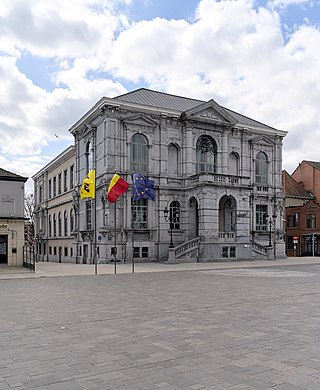
Vilvoorde is a Belgian city and municipality in the Halle-Vilvoorde district (arrondissement) of the province of Flemish Brabant. The municipality comprises the city of Vilvoorde proper with its two outlying quarters of Koningslo and Houtem and the small town of Peutie.
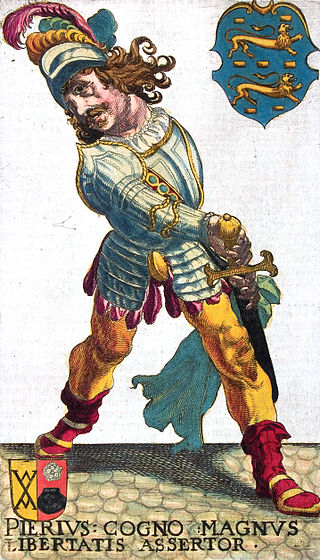
Pier Gerlofs Donia was a Frisian farmer, rebel leader, and pirate. He is best known by his West Frisian nickname Grutte Pier, or by the Dutch translation Grote Pier, which referred to his legendary size, strength, and bravery.
The Friso-Hollandic Wars, also called Frisian-Hollandic Wars, were a series of short medieval wars consisting of the attempts made by the counts of Holland to conquer the free Frisian territories, which lay to the north and east of their domain. These wars were waged off and on from 1256 to 1297, 1324 to 1348, 1396 to 1411, and from 1421 to 1422, although it could be argued that a state of war continued to exist between the County of Holland and the Frisian territories till well after the year 1500.
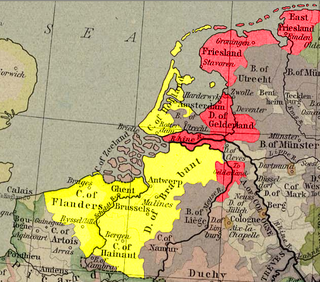
The Guelders Wars were a series of conflicts in the Low Countries between the Duke of Burgundy, who controlled Holland, Flanders, Brabant, and Hainaut on the one side, and Charles, Duke of Guelders, who controlled Guelders, Groningen, and Frisia on the other side.
Haring Harinxma (1323–1404) was a powerful Frisian chieftain and Schieringer who lived during the 14th and early 15th centuries. Haring also used the surname Donia, and is considered the patriarch of this well known Frisian family. Another title used by Haring was thoe Heeg meaning 'of Heeg', where he was born and lived.

The Vetkopers and Schieringers were two opposing Frisian factional parties from the medieval period. They were responsible for a civil war that lasted for over a century (1350–1498) and which eventually led to the end of the so-called "Frisian freedom".

The Frisian freedom was a period of the absence of feudalism in Frisia during the Middle Ages. Its main aspects included freedom from serfdom, feudal duties and taxation, as well as the election of judges and adjudicators.

Georg Schenck van Toutenburg was Stadhouder of Friesland (1521-1540). Later he was also Stadholder of Overijssel, Drenthe and Groningen. His son Frederick was the first archbishop of Utrecht.

The Arumer Zwarte Hoop, meaning "Black Army of Arum" was an army of peasant rebels and mercenaries in Friesland fighting against the Habsburg authorities from 1515 to 1523. For four years they were successful under the former farmer Pier Gerlofs Donia. Led by his Lieutenant Wijerd Jelckama from 1519 they slowly lost ground and were captured and executed in 1523.
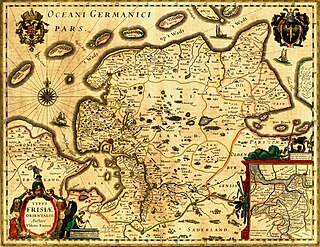
The County of East Frisia was a county in the region of East Frisia in the northwest of the present-day German state of Lower Saxony.

Focko Ukena was an East Frisian chieftain (hovetling) who played an important part in the struggle between the Vetkopers and Schieringers in the provinces of Groningen and Friesland. Aside from this he was one of the leading figures in the resistance against the forts of stately authority in East-Frisia of the tom Brok family.
Dutchification is the spread of the Dutch language, people or the culture of the Netherlands, either by force or cultural assimilation.

Almenum is a historic locality in the northern Netherlands, near Midlum, Friesland the site of the first Christian church in Friesland. Saint Boniface set up a local church in the locality in 754. The location of the church is on the Terp of Almenum, a mound of earth about five meters high. Almenum is named after the place where someone called "Allaman" lived. The -um suffix is derived from the West Frisian word "hiem" meaning "home". An alternative explanation for the name of the locality is that it originally meant common lands for grazing cattle. In Icelandic this kind of land still uses the term "almenningurheim".
Ats Bonninga was Frisian noble, known for her defence of a fortress in Warns in Gaasterland during the conflict between the Schieringers and the Vetkopers party in 1494.
The Saxon feud was a military conflict in the years 1514–1517 between the East Frisian Count Edzard I, 'West Frisian' rebels, the city of Groningen, and Charles II, Duke of Guelders on the one hand and the Imperial Frisian hereditary governor George, Duke of Saxony – replaced by Charles V of Habsburg in 1515 – and 24 German princes. The war took place predominantly on East Frisian soil and destroyed large parts of the region.
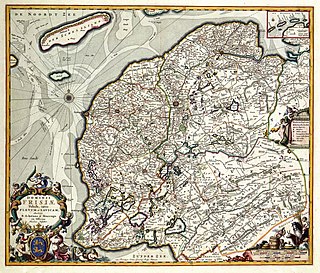
The Lordship of Frisia or Lordship of Friesland was a feudal dominion in the Netherlands. It was formed in 1498 by King Maximilian I and reformed in 1524 when Emperor Charles V conquered Frisia.
Factionalism in the medieval Low Countries, in Dutch historiography known as partijstrijd or (partij)twisten, comprises several political, military and socio-economic conflicts in the Low Countries during the Middle Ages, especially the Late Middle Ages. The so-called 'parties' usually behaved like factions, which were formed ad hoc, could rapidly change in composition, and usually did not have strong ideological underpinnings. They were not officially organised political parties as would emerge in the 19th century. The parties were normally led by an aristocratic clan, followed by patrician families, and eventually several groups from the bourgeoisie, generally organised by guilds. These groups could often switch allegiances, names and goals, secede or defect, depending on how situations and interests evolved. Usually there were long-term tensions and only brief military confrontations, which either resulted in a new balance of power, or confirmed the status quo. The ruling dynasties or bishops could be dependent on the support from the strongest faction in order to govern, and in case of a war of succession, pretenders were compelled to ally themselves with one party or the other to stand a chance as seizing power. Foreign powers could interfere in factionalist struggles by providing financial or military support, and sometimes take over control of a province with the help of a local party.
Potestaat was the supposed title of a governor of medieval Friesland. According to the legendary Karelsprivilege, a 14th-century forgery, Charlemagne had first granted the title of potestaat to Magnus Forteman. He and most of his early successors were entirely fictional, invented later by pseudohistorians in order to argue in favour of the notion of Frisian freedom. The title potestaat does not appear in historical documents until 1470. It became popular after 1578, when the idea of the inherited office of potentate was linked to the new office of stadtholder, which was held by the House of Nassau-Dietz.